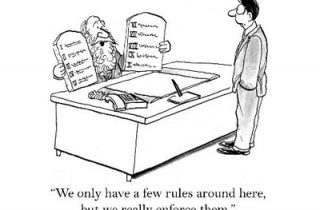Are any of these situations familiar to you?
- An associate you ask to do a task for one of your clients (as you lack the necessary expertise yourself), speaks to the client direct, and next thing you know, they’ve taken a brief from the client to do some more work for them and not mentioned it to you…OK, or not OK?
- You agree a job, a price and a deadline with a supplier. The supplier runs way over time, and then cries, “unfair!” when you suggest reducing the amount you pay because they haven’t fulfilled their part of the contract…Are you being reasonable, or not?
- Someone commits to starting a meeting with you at a specific time, then takes a call just as the meeting is due to start, and continues to talk for over 15 minutes, before arriving for your meeting late and with the most offhand apology…Do you get annoyed?
For 20 years or more, we’ve operated within what we thought were the more or less universal ‘rules of engagement’ of professional service provision, at least in the UK/US/Western business world. But increasingly, it seems, other people don’t know these rules, or are actually operating by a completely different set!
The unwritten rules, written down
Here’s our list of what we think are the ‘unwritten rules’ – perhaps it’s time someone wrote them down:
- Do what you said you would do – make promises and stick to them. Don’t tell them your problems, just say what you can commit to. If something comes up, inform the person affected. Don’t make excuses, just explain. Take their reaction on the chin and don’t whinge!
- Take accountability for your projects. Make clear deadlines and stick to them. Don’t wait passively for others; go after them, and make sure it gets done. Never use anyone else’s failure as an excuse.
- Confirm your instructions and other people’s commitments in writing. Just because someone has agreed to do something doesn’t mean it will get done.
- Never invade the territory of any other person, business, service or department without consent from the person in charge. Nobody likes to see their territory violated, interference in general causes errors and confusion, and if you’re willing to take someone else’s work, you’ll get a reputation as untrustworthy.
- Be extremely careful about accuracy. Never guess when you don’t know the answer to a direct question. People will stop trusting you. Learn to say, “I don’t know.” If used when appropriate, it will be often.
- You are always working for a boss – even if you’re self-employed, your client or main contractor is the boss. Keep him or her informed. Avoid surprises. Whatever the boss wants takes top priority. When he asks you to do something, you have two possible responses: 1) do exactly what he asked; 2) meet with him and talk about his request with him. It is unacceptable not to do it, or to do something else instead!
- Always be direct. Never “cc” a person’s boss, client, etc. If you have a complaint, direct it to the person concerned and make clear requests.
- Include everyone who ought to be included. Don’t hurt anyone by neglecting the interests of a department or an individual. It may not seem very serious, but you’ll get a reputation for stealing people’s thunder.
- Be careful about who gets their hands on your letters and messages. To be perfectly sure act as if all the documents you write will end up in everyone’s office and be there forever. Write them with that in mind. This includes Facebook!
- Don’t use other people’s stuff, including their intellectual property – it could be considered suspicious at best, and at worst, outright theft. If you want to use an idea, or a piece of equipment, for personal use, just ask – and thank them afterwards!
- Ask for and send progress reports, as well as final reports as projects are completed. Your business is not totally organised until you put this in place, and it’s an important part of being professional to keep people informed.
- Don’t whine, backstab or fingerpoint. Keep your sense of humour, and be easy and fun to work with.
It’s hard to be squeaky clean and never violate any of these rules – but it’s ten times harder if we don’t agree up front what they are! These are the ones I came up with off the top of my head and that we try to stick to. But maybe you’ve got some completely different ones – or I’ve missed some: let us know what you think…
